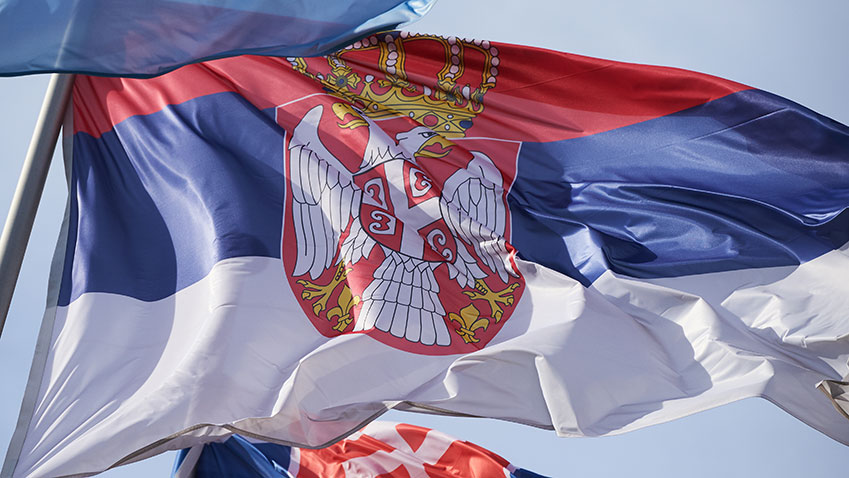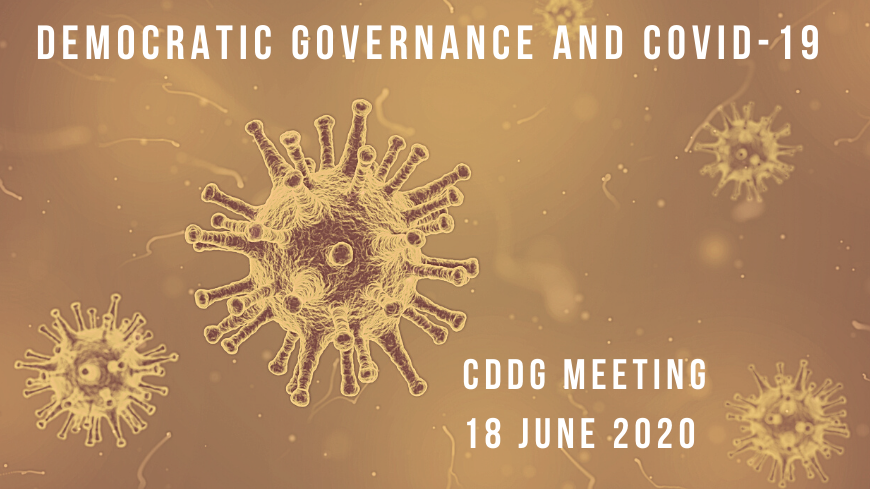Centre of Expertise for Good Governance and COVID-19
The Centre of Expertise for Good Governance helps European countries deliver good governance by providing capacity-building activities and policy and legal advice to local, regional and national authorities. Throughout the Covid-19 emergency, the Centre of Expertise continues its mission, having shifted a wide range of its activities online.
To better meet the specific needs of the beneficiaries, the Centre of Expertise for Good Governance constantly invests in research and expertise, developing innovative and practical tools. Here are some examples:
Resilience Building Strategies
In adopting urgent measures to contain the COVID-19 pandemic, public authorities have also faced challenges to ensure the effectiveness and continuity of public administration in respect of principles of good democratic governance. Based on examples of good practice shared by members of the CDDG, and inspired by recent trends in policy-making towards a more pro-active approach to building strategies that reduce risk, enhance resilience, and focus on recovery and functionality, the Centre of Expertise for Good Governance has prepared a new Toolkit.
The ReBuS - Resilience Building Strategies - toolkit has been developed as a resource to be used by public authorities when drafting strategies and implementing actions aimed at building community resilience. It contains awareness-raising, analytics; planning, and capacity-building elements which can help authorities measure the ability of an administration to persist and maintain performance; incorporate resilience in strategic planning; and develop capacities to build institutional resilience to emergencies and disasters.
Building leadership in times of crisis
Leadership is more than ever necessary in crisis situations. This is why the Centre of Expertise for Good Governance has included a new training and capacity-building module in its 2020 edition of the Leadership Academy Programme. The new module gives participants an insight on different aspects of a crisis (psychological, socio-economic), explains how to set up crisis management teams and provides guidance on how to develop a communication strategy.
Although specifically developed to help officials tackle the Covid-19 emergency, the module is of general relevance and application for any crisis or emergency situation, such as natural disasters, environmental accidents, terrorist threats and even conflicts. It is specifically conceived for the local level but it can be easily adapted to other levels of government. An additional module will cover the issue of leadership in times of crisis and emergencies in cross-border cooperation.
The training module can be accessed here.
Teleworking in Public Administration
The Centre of Expertise for Good Governance published its toolkit TPA - Toolkit on Teleworking in Public Administration. The toolkit is designed to facilitate decision making on the different aspects of teleworking within public administrations.

Albania
Council of Europe support to public administration reform helps in the response to the Covid-19 pandemic
The public administration platform www.Administrata.al was launched in Albania in April 2019. It was designed to ensure unification of human resource management procedures at central and local levels and help improve communication across all levels of public administration in Albania.
The platform, developed in the context of a project implemented by the Centre of Expertise for Good Governance and funded by Swiss Development Cooperation, has proven to be a valuable tool for managers across public administration in Albania in responding to the Covid-19 pandemic emergency.
Ms Albana Kociu is Director of the Department of Public Administration in Albania and a member of the Council of Europe’s European Committee on Democracy and Governance (CDDG). In this presentation she explains how the platform has helped Albanian public officials adapt to new working conditions and speaks about the additional measures she has introduced to help improve communication channels among officials operating in a common virtual workplace.

Armenia
Covid-19 and amalgamated municipalities in Armenia
The Government of Armenia declared a state of emergency on 16 March 2020 in response to the Covid-19 pandemic and established a Crisis Management Centre, under the authority of the Deputy Prime Minister, to ensure centralised management of the crisis.
How did the pandemic affect amalgamated communities? The Democratic Development, Decentralisation and Good Governance in Armenia project, implemented by the Centre of Expertise for Good Governance, launched a survey of the 52 Consolidated Communities in Armenia to assess the impact of the pandemic on local government.
The key findings of the survey include recognition that amalgamation has helped communities respond more efficiently to the crisis, although they also acknowledged that existing local emergency response plans were neither useful nor effective. In general, coordination between levels of governance in Armenia worked smoothly; local authorities were able to fulfil their basic functions, and new examples of inter-municipal cooperation emerged.
However, significant challenges were faced by municipal staff with regards to teleworking; a lack of resources and IT equipment; and the need to assume additional tasks and roles in response to the emergency. Interestingly, local authorities who were previously reluctant to adopt e-governance measures accept that they need more technical tools and skills and would benefit from a comprehensive capacity-building programme in order to better prepare the continuity of their work in the future.

Hungary
Collecting best practice on the response to COVID-19 at local level
The Centre of Expertise for Good Governance has been supporting the implementation of its Best Practice Programme (BPP) in Hungary for many years. In 2020, the theme of the BPP is "Recovery and reconstruction to mitigate damage caused by the epidemic: innovations in local government”. Municipalities can submit applications to share best practices in areas such as local economic recovery and attraction of municipal investments; social inclusion - effective local methods to combating poverty; public security; elderly care; innovative solutions in municipal government. During the stage of the evaluation of the applications, several conference and training will be organised online. The winners of the best practice contest will be announced between the end of November 2020 and March 2021.
Download the Professional Report on Local Government BPP Hungary >>

Serbia
As a response to the state of emergency caused by Covid-19, the “Human Resource Management in Local Self-governments – Phase 2” programme team distributed a survey to Serbian local authorities to identify their particular needs and challenges in this situation, as well as potential areas of support. More than 100 cities and municipalities participated, and an analysis of the responses has been providing useful insights on the way public administration is operating in times of crisis.
Inter alia, the survey indicated that: local governments were hit hard by the pandemic, but largely continued to carry out main functions; an institutional plan for working under special circumstances and for handling personnel during the crisis was lacking; investments in technology enabling online work, as well as related trainings for employees, should be considered. To see the full survey results, click here.
In addition, the programme team used the existing online portal for “on-demand” advisory assistance for Serbian local governments, set up by the programme partners in September 2019, to upload and share several document templates for the implementation of measures related to the crisis. These included, for example, templates for remote working and for weekly activity plans of organisational units.

Ukraine
Managing human resources in local authorities during Covid-19
On 21 and 23 April 2020, in the context of the Council of Europe Programme on “Decentralisation and Local Government Reform in Ukraine”, the Centre of Expertise for Good Governance in co-operation with the Chernihiv Regional Training Centre delivered the Special Online Short-Term Training Programme "Human Resources Management in Local Authorities in Crisis Conditions" for amalgamated territorial communities of the Chernihiv oblast.
The training focused on a range of issues related to regulation of labour relations with local officials, employees of local councils, municipal services, institutions and organisations during the confinement measures in Ukraine. Possible tools for organising remote activity of local staff and remote meetings of local councils and their executive bodies were also considered.
The Training Programme was developed at the request of the National Agency of Civil Service. Participants also used materials form the 2nd Human Resources Digest, specifically dedicated to changes in labour relations due to the confinement measures.
in the field of:





